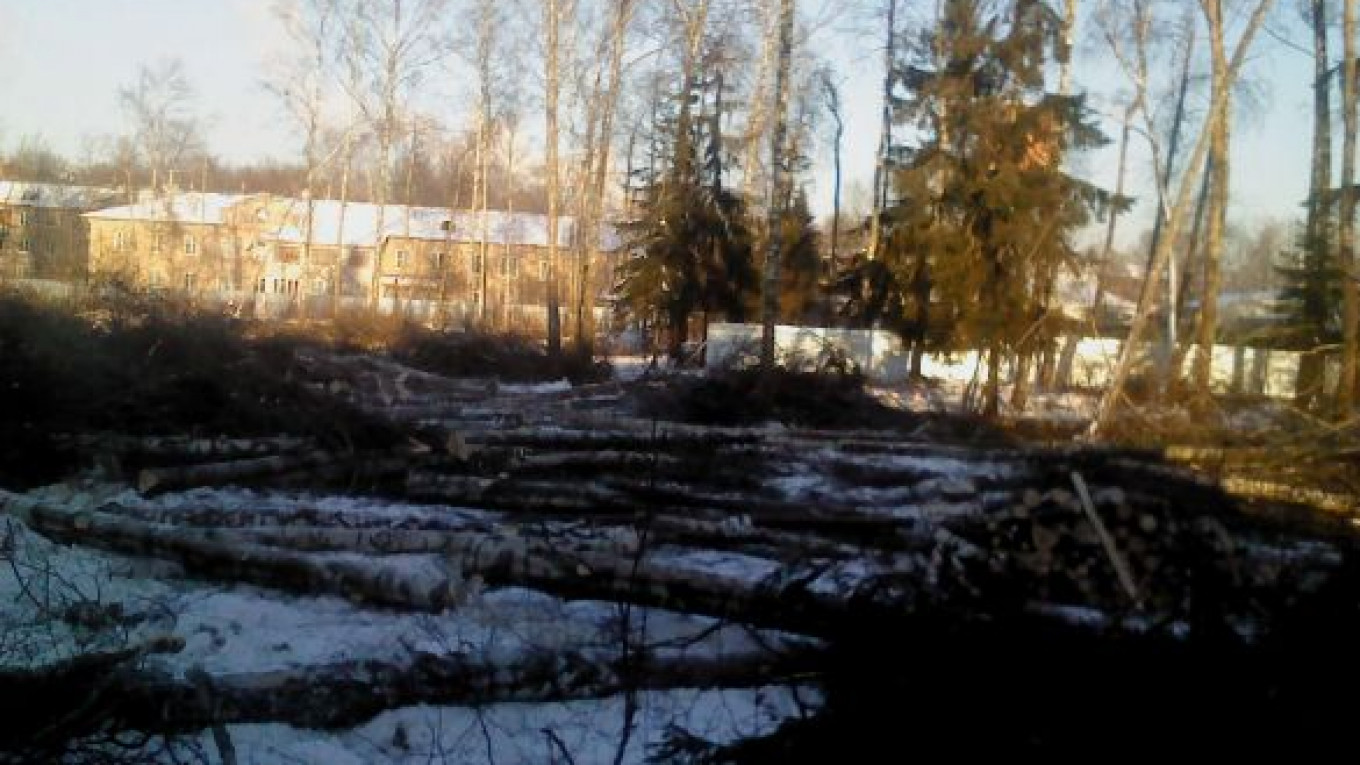Around 50 local residents protested Monday at a construction site in the Selyatinsky Forest outside Moscow, where environmental activists and construction workers are locked in a battle over pristine woodland.
Activists obstructed construction equipment in an effort to stall work on a multistory housing development, set to be built on land sold by municipal authorities for the project.
The protest followed a statement Sunday by a regional environmental group saying that an activist was hospitalized after being assaulted in Moscow earlier this month, an attack that, if confirmed, would be the latest in a series of beatings of environmental activists in the region.
The Selyatinsky Forest activists had earlier organized a car rally and informal stroll through Selyatino, the Moscow region town 50 kilometers southwest of the capital where the housing is due to be built, to drum up support for their cause.
After builders contacted police, Tatyana Pavlova, head of the We Will Save the Selyatinsky Forest action group, was detained around noon on Monday.
Pavlova was later given a misdemeanor charge for failing to obey law enforcement officials, she said by phone, adding that officials had previously threatened her with extremism charges. Extremism is punishable by a prison sentence of up to five years.
On Sunday, a regional environmental group published a statement saying that Alexander Tolstov, an activist with Pavlova's group, was assaulted in Moscow in early January by unidentified thugs.
"Unidentified individuals shoved the young man into a car near the Preobrazhenskaya Ploshchad metro station, beat him up and threw him out in the Medvedkovo district," the group Ecological Defense of the Moscow Region said.
The statement pointed to a separate attack on volunteers gathering signatures in defense of the Selyatinsky Forest as proof that the group's activists face threats over their stand against the construction project.
Pavlova called the assault on Tolstov an effort to scare activists into abandoning their campaign, adding that Tolstov remained hospitalized and that her group would continue to attempt to block construction in the forest.
A Moscow police representative denied knowledge of the attack on Tolstov in comments carried by RIA-Novosti on Monday.
Trees began to be cut down in Selyatino in late December, despite acting Moscow region Governor Andrei Vorobyov having said days earlier that local opposition to the project should be taken into account.
The project envisages erecting multistory apartment blocks on three parks and a 73-hectare wooded area that formerly belonged to Selyatino's municipal authorities.
Yevgeny Golubev, the town's chief, subsequently called activists "occupiers" and "American troops" at a recent meeting of the ruling United Russia party, according to the Ecological Defense of the Moscow Region.
The struggle over the Selyatinsky Forest has drawn comparisons with the dispute over forestland around the Moscow region city of Khimki, where several activists opposed to the construction of a toll road connecting Moscow and St. Petersburg have been severely beaten.
In November 2008, Mikhail Beketov, editor-in-chief of a Khimki newspaper, was attacked outside his home and suffered brain damage as a result of the beating. Beketov had actively campaigned against the toll road.
Konstantin Fetisov, a green activist who headed the Khimki branch of the Right Cause party, was beaten so badly in November 2010 that he fell into a coma.
Related articles:
A Message from The Moscow Times:
Dear readers,
We are facing unprecedented challenges. Russia's Prosecutor General's Office has designated The Moscow Times as an "undesirable" organization, criminalizing our work and putting our staff at risk of prosecution. This follows our earlier unjust labeling as a "foreign agent."
These actions are direct attempts to silence independent journalism in Russia. The authorities claim our work "discredits the decisions of the Russian leadership." We see things differently: we strive to provide accurate, unbiased reporting on Russia.
We, the journalists of The Moscow Times, refuse to be silenced. But to continue our work, we need your help.
Your support, no matter how small, makes a world of difference. If you can, please support us monthly starting from just $2. It's quick to set up, and every contribution makes a significant impact.
By supporting The Moscow Times, you're defending open, independent journalism in the face of repression. Thank you for standing with us.
Remind me later.






